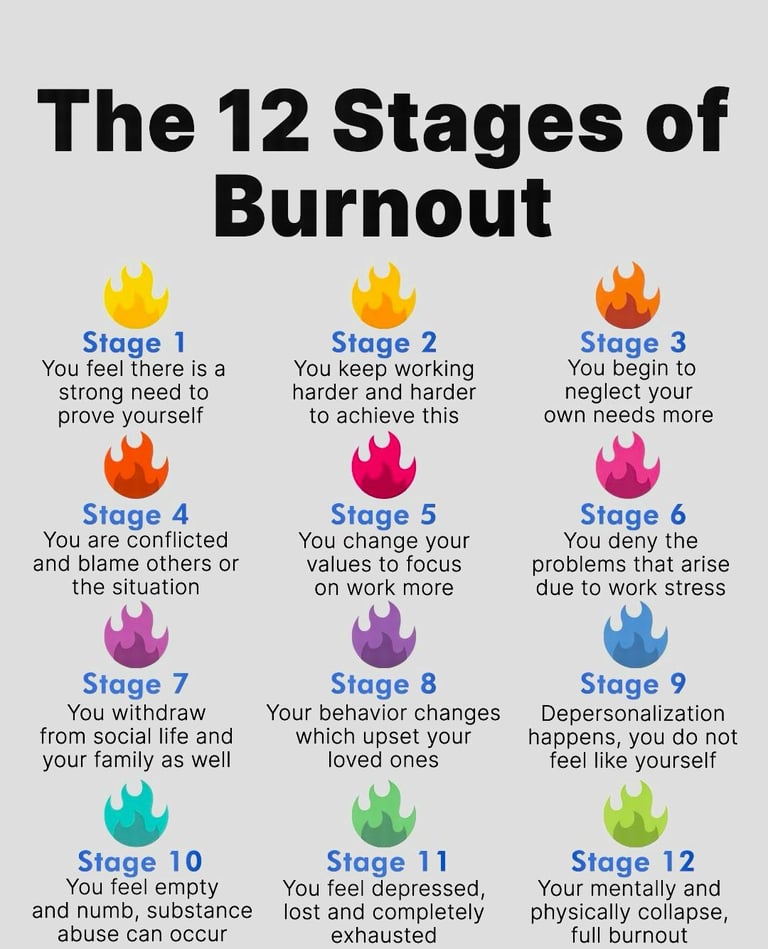Add your promotional text...
Breaking Point: Unveiling the Silent Epidemic of Burnout


Breaking Point: Unveiling the Silent Epidemic of Burnout
Burnout is a sneaky beast that can sneak up on anyone who faces high levels of stress on a regular basis, whether it's due to work or other factors. This condition can drain the happiness and energy from your career, relationships, and even your personal life. Whether you're tirelessly caring for a sick loved one, working long hours, or constantly bombarded with distressing news, the relentless exposure to stress can push you towards burnout.
The tricky part is that burnout doesn't always announce its presence with flashing neon signs. It can silently creep into your life, affecting your mental and physical well-being without you even realizing it. That's why this blog will be a helpful guide to help you spot the warning signs of burnout and, more importantly, take steps to prevent it. As you utilize these steps keep in mind, it's not just about self-care. Understand the importance of supporting those around us who may be going through the same struggles. Remember, burnout is not a sign of weakness or failure. It's a common and understandable response to prolonged stress. By recognizing the signs and taking proactive measures, we can all work towards building healthier, more resilient lives.
What is Burnout?
Burnout is a debilitating condition characterized by extreme stress that results in profound physical, mental, and emotional exhaustion. Much worse than ordinary fatigue, burnout makes it challenging for people to cope with stress and handle day-to-day responsibilities. People experiencing burnout often feel like they have nothing left to give and may fear getting out of bed each morning. They may even adopt a pessimistic outlook toward life and feel hopeless.
We can all be at risk to experience burnout at some point in our lives, especially those who are continually exposed to high levels of stress. Those who work in the service industry, as well as first responders, doctors, and nurses are especially vulnerable to this health condition.
Along with career-induced burnout, single parents caring for children can also have this type of extreme exhaustion. A recent study found that, just like doctors and business executives, mothers and fathers can also burn out. Just as a tightly wound spring can eventually lose its elasticity, people with personality characteristics like needing to be in control, perfectionism, and being 'Type A' can increase their risk of burnout. In the same way that a pressure cooker left unchecked can reach dangerous levels and explode, the combination of high levels of stress, and life’s daily uncertainties can lead to burnout.
Feeling burned out but not sure what the signs are? Here are some of the more common signs.
1. Weakened immune system: Long-term stress from burnout can lower your immunity, making you more susceptible to illnesses like colds, the flu, and insomnia. It can also contribute to mental health issues such as depression and anxiety. Remember, recognizing these signs is the first step towards addressing burnout and taking care of yourself.
2. Irritability: Burnout can make you more prone to losing your temper with loved ones and colleagues. Everyday stressors like work meetings, school runs, and household chores may start to feel overwhelming, especially when things don't go as planned.
3. Isolation: Overwhelmed by burnout, you may withdraw from socializing and stop confiding in friends, family, and colleagues.
4. Exhaustion: Feeling physically and emotionally drained. You may experience headaches, stomachaches, and changes in appetite or sleep patterns.
5. Daydreaming of escape: Dissatisfaction with the never-ending demands of your job may lead to fantasies of running away or taking a solo vacation. In extreme cases, some may turn to substances or food as a means of numbing emotional pain.
It’s important to note that burnout does not simply dissipate over time and, if left untreated, it can have serious consequences on both physical and psychological well-being, such as depression, heart disease, and diabetes. Unlike a sudden cold or flu, burnout doesn't happen all at once. Psychologists have identified 12 Stages of this stress syndrome:
Here are some effective ways to combat stress and prevent it from taking over your life:
I. Practice Mindfulness: Engage in mindfulness techniques such as meditation, deep breathing exercises, or yoga. These practices help you stay present, reduce anxiety, and promote relaxation.
*Journaling: Write down your thoughts, feelings, and experiences without judgment. This helps you gain clarity, process emotions, and reduce anxiety by expressing yourself in a non-judgmental way. Consistent practice is key for these techniques to be effective. Find what resonates with you and incorporate it into your daily routine to experience the benefits of mindfulness in reducing anxiety and promoting relaxation
**Mindful Eating: Engage all your senses while eating, paying attention to the taste, smell, texture, and appearance of the food. Slow down and savor each bite, bringing your full awareness to the experience of eating.
II. Maintain a Healthy Lifestyle: Eat a balanced diet, exercise regularly, and get enough sleep. Taking care of your physical health strengthens your resilience to stress.
III. Set Boundaries: Learn to say no and establish healthy boundaries. Prioritize your needs and don't overcommit yourself. It's important to find a balance between work, personal life, and self-care.
IV. Time Management: Organize your tasks and prioritize them based on importance. Break larger tasks into smaller manageable ones. Effective time management reduces stress by giving you a sense of control and accomplishment.
V. Seek Support: Reach out to friends, family, or a support network. Sharing your concerns and seeking guidance from others can provide emotional support and different perspectives.
VI. Engage in Relaxation Techniques: Find activities that help you relax and unwind, such as reading, listening to music, taking a bath, or engaging in a hobby. These activities can help reduce stress and promote a sense of calm.
VII. Practice Self-Care: Take time for self-care activities that bring you joy and relaxation. This can include activities like taking a walk in nature, practicing self-reflection, indulging in a hobby, or treating yourself to something you enjoy.
VIII. Prioritize Healthy Relationships: Surround yourself with supportive and positive individuals. Nurture healthy relationships that provide emotional support and encouragement. Remember, everyone's stressors and coping mechanisms are different. It's important to find what works best for you and make self-care a priority in order to effectively combat stress and prevent it from taking control of your life.
IX: Targeted Problem-Solving: When you know the specific sources of stress in your life, you can focus your energy and resources on addressing those specific areas. This allows you to develop targeted strategies and solutions rather than applying generic or broad approaches to managing stress. Identifying the source of your stress helps you become more aware of the triggers and patterns that contribute to your stress levels. This awareness helps you understand why certain situations or circumstances cause stress, allowing you to develop a deeper understanding of your own reactions and emotions. Once you have identified the source of stress, take a proactive approach to address it. This involves taking steps to either eliminate or minimize the stressor, or developing effective coping mechanisms to deal with it.
In summary, by identifying the causes of burnout you will find that you will be more self-aware, solution oriented, have reduced stress, improved well-being, feel empowered, and refreshing relationships. So use this information to take control of your stress, stay ahead of burnout, and progress towards a more balanced and fulfilling life!






Contacts
alphalion@7lionfitness.com
Socials
(480) 925-7969
© 2023 -2024 7 lion Fitness. All Rights Reserved.
